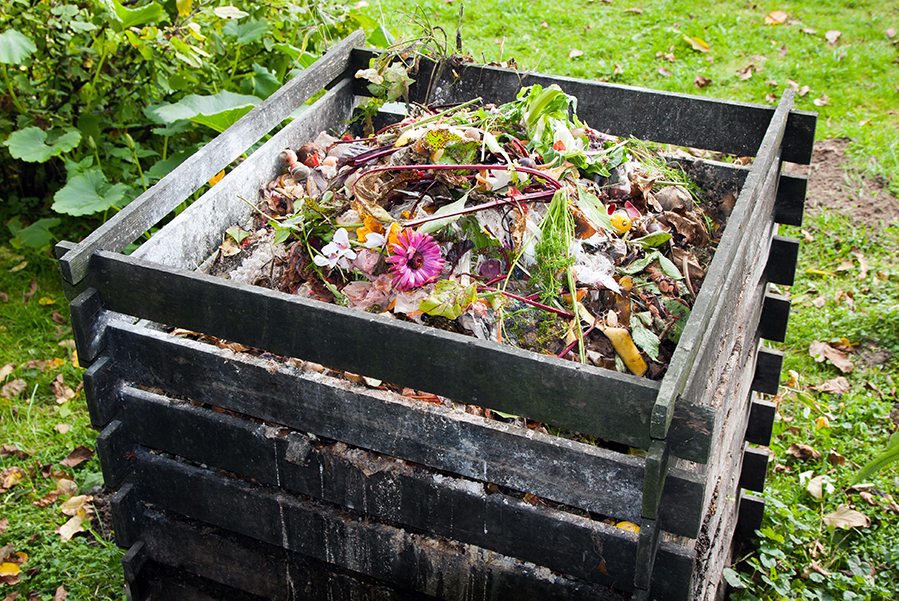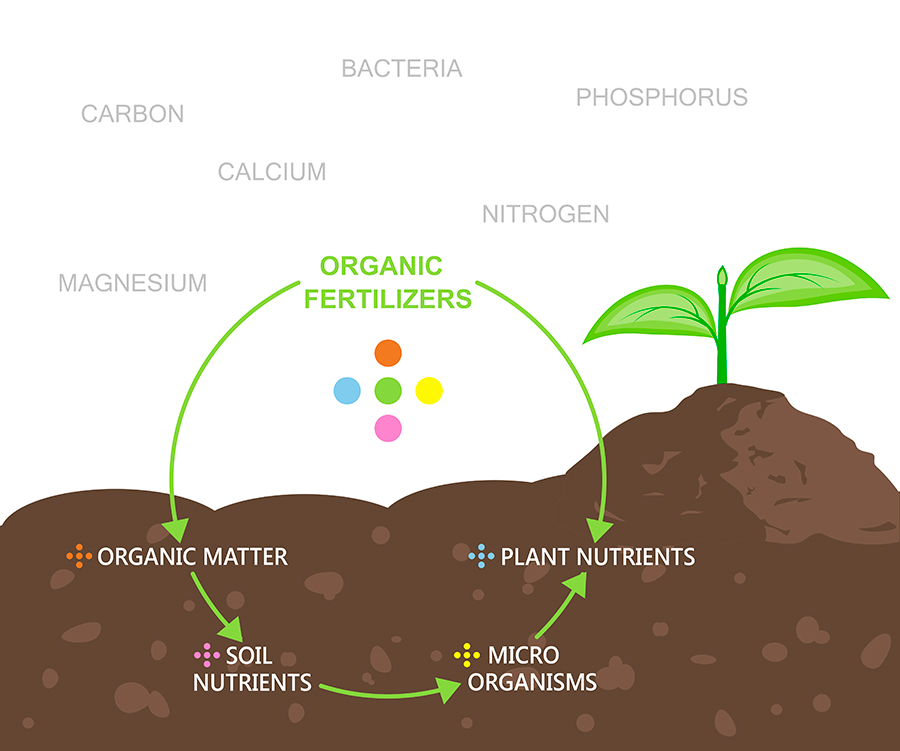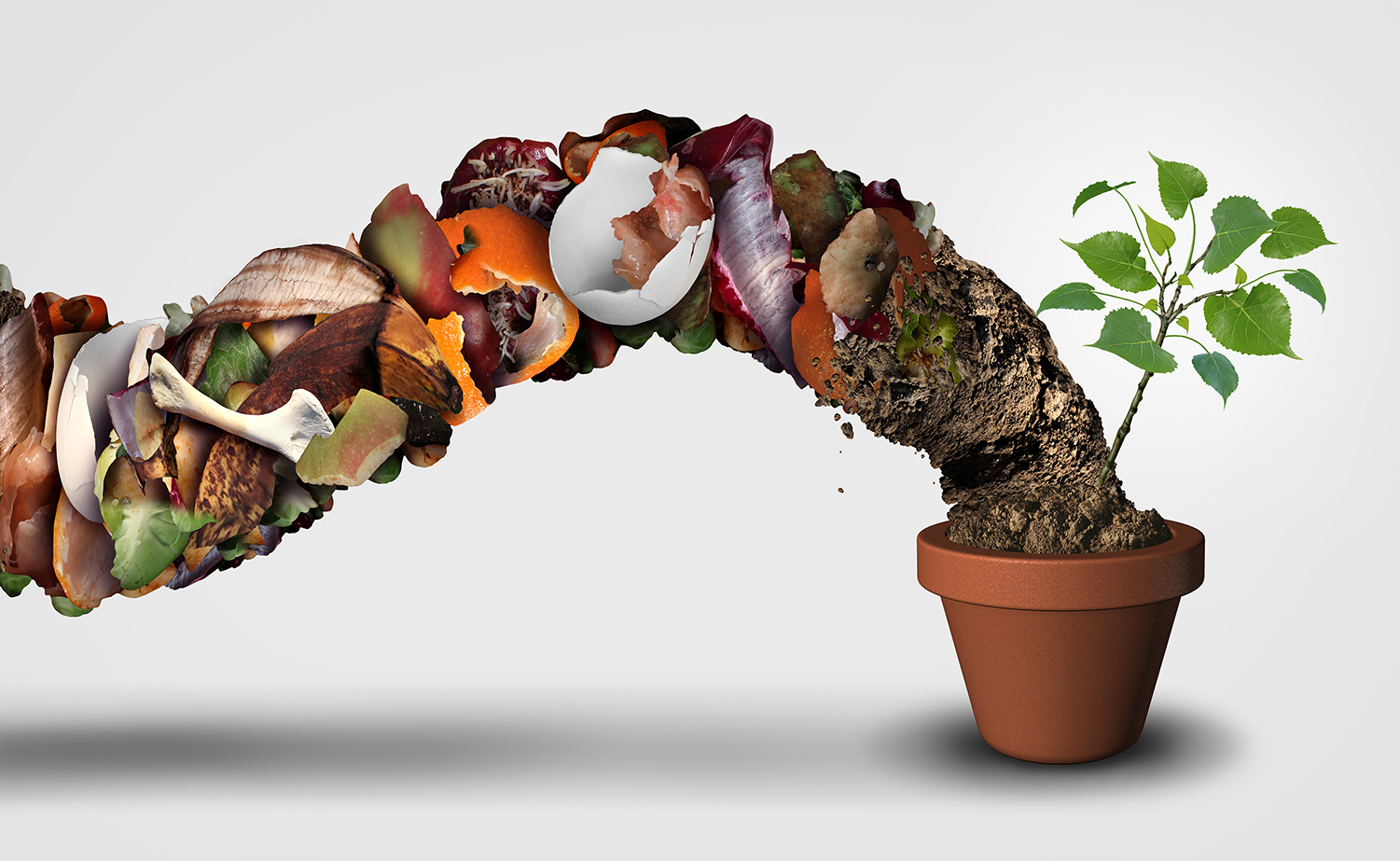The word “Organic” can mean a few different things. If you’re like me, you might be wondering what are organic nutrients and why are they important for my garden? And which meaning of organic am I looking for?
Are we talking about nutrients that contain carbon compounds, nutrients in general that occur naturally, or maybe even nutrient products that are certified organic products? I’ll go through the various ways in which the term organic is used in connection to plant nutrients, and why organic nutrients are so important for a garden to reach its full potential.
Different Meanings of Organic
Derived from Living Matter
Most often when we’re talking about organic nutrients or organic matter, we mean that it was derived from living material, like plants or animals. Organic nutrient sources include compost, manure, and plant residue. Organic matter is decomposed by soil organisms to release valuable nutrients into the soil, and make them available for your plants to absorb.
In chemistry, organic compounds are those which contain carbon. Carbon is an important building block that plants need to grow, but they actually get their carbon supply from the air. Plants absorb carbon dioxide from the air through their leaves, and using the process of photosynthesis, turn it into the necessary sugars and starches that they need to grow.
So, plants don’t rely on organic molecules as a source of carbon, but this definition from chemistry does go hand-in-hand with the previous one. Since all living things are made up primarily of carbon compounds, organic nutrients are the ones that plants get from the decomposition of living matter. Organic nutrients help supply plants with available inorganic compounds, but the term organic is a way to classify the source as natural.

Natural
Organic is also used to refer to compounds that are naturally occurring in the environment. They are not chemically synthesized in a laboratory somewhere, but are simple components that can be found in nature.
Typically, products are labeled as organic or natural to indicate that they are allowable for organic farming practices. Organic products used as supplements in your garden should not contain any chemical pesticides, synthetic nutrients, or non-natural ingredients.
But even some inorganic or manufactured fertilizers, like mineral based products, are natural, and can be acceptable for organic growers. And not all organic fertilizers are certified organic.
The use of the word organic on commercial products is now pretty well regulated and supported by independent review groups. So, if you see the term on a commercial nutrient product, and it’s listed with a third party organization like OMRI, you know that it is actually certified organic. It is acceptable as a soil amendment for use in organic growing operations. These products have gone through a rigorous approval process to be able to claim the organic status.
Why Are Organic Nutrients Important?
Any avid grower knows that plants need the right nutrients to grow. Poor soil health, or inadequate amendments in a hydroponic growing operation, can deprive your plants of the essential nutrients that they need, and lead to lower crop yields and subpar harvest.
What Nutrients Do Plants Need?
Plants need a number of different compounds for their essential metabolic functions. Carbon, Hydrogen, and Oxygen are supplied from the air and water that your plants take in, so they’re typically quite abundant.
But the rest of the nutrients are supplied to your plants from the soil, dissolved in the water, or added as a supplement. The inorganic nutrients that plants rely on the most from their growing media are Nitrogen, Phosphorous, and Potassium which play key roles in photosynthesis. You’ll see these listed on commercial fertilizers as levels of NPK.
Organic nutrients store these important inorganic compounds and other valuable nutrients, but depending on the source, they are not immediately available to your plants. They have to first be converted into inorganic nutrients with the help of soil organisms. This takes time, making organic matter a source of slow release nutrients, usually at lower concentrations than other fertilizers.
Organic matter varies widely in its composition, and therefore also varies in the amount and availability of nutrients. Decomposing plant matter in a compost pile contains very different components than manure, so they will offer your plants different levels of nutrients.
Can You Add Too Much Organic Matter?
Consistent addition of a single type of organic material can actually lead to imbalances of nutrients if it’s not a well-balanced source. If you’re adding compost or manure to your soil that’s high in phosphorous and potassium, but low in nitrogen, you could begin to accumulate those compounds in your soil as you work to meet the nitrogen demand of your plants.
This is not only inefficient financially, but it can be detrimental to your plants. Certain compounds can become toxic to your crop at high enough concentrations.
How Do Plants Get Those Essential Nutrients?
Most nutrients are already available in your garden soil, but they may not be present at the right amounts. This is where amendments like organic matter and fertilizers come in. By using careful management of nutrient supplements, you can improve soil health in your garden and help your plants flourish.
It’s a good idea to do a soil test to determine the health of your soil before you start adding any nutrients. The first step to creating an optimal, nutrient dense environment for your plants is knowing what your plants are lacking (or getting an excess of!). If you’re adding your own compost, you can also test that for its nutrient value.
Hydroponic growing operations rely even more heavily on nutrient additions than traditional gardens because they don’t have the added benefit of nutrient uptake from soil. When growing in a soil-free environment, all essential nutrients for plant growth must be added, typically dissolved in water. Similarly in indoor growing environments like greenhouses, biological activity may not be strong enough to support efficient decomposition and release of nutrients from organic matter. So organic fertilizers with readily available nutrients are a key source of plant nutrition.

Organic Nutrient Sources Support Soil Health
Organic matter in your garden soil not only supplies valuable nutrients, but it also promotes the biological health and physical structure of the diverse ecosystem that your plants rely on from your garden soil.
Soil microbes, including fungi and bacteria, and larger organisms like earthworms depend on organic material to survive. They convert organic compounds into usable compounds that your plants can absorb. And during that process, the soil organisms form a robust structure of pores in the soil that help with root growth, drainage, and the distribution of water.
The addition or organic matter to your soil also helps introduce more moisture. This helps the soil retain water, which is essential for plant life, and supports the formation of aggregates. Aggregates are structures within the soil that cling together more closely. They can help regulate the depletion of organic nutrients by protecting the organic matter from biological activity. This aids organic nutrients in providing sustained resources to your plants.
Organic Growing
Organic fertilizers come from plant or animal sources like manure and compost. As we discussed above, they are natural. Inorganic fertilizers on the other hand are manufactured. They are created, synthesized, and often contain chemical compounds that would not otherwise occur naturally in the environment.
Many people like to know exactly what’s going into their crops, and choosing an organic nutrient supplement over chemical fertilizers ensures that you’re only putting natural compounds into your garden. If you have an organic certified growing operation, then it’s critical that you only use organic fertilizers that are allowable for organic farming practices.
But it can be hard to know which products are acceptable for organic growing. Some inorganic, or manufactured fertilizers made from minerals can also be acceptable for organic growing operations. Processing of the minerals makes the product more efficient, and easier for plants to absorb. Although the product is processed, it doesn’t contain any unnatural compounds.
The Association of American Plant Food Control Officials (AAPFCO) defines organic fertilizers as ones that contain carbon and another element necessary for plant growth, other than hydrogen and oxygen. That’s a pretty broad definition.
Certified Organic Products
When in doubt, look for the OMRI label. The Organic Materials Review Institute helps growers identify which products they can confidently use on their organic plants. It is a third party that reviews organic products to help maintain organic integrity. Products that are OMRI listed have gone through an extensive review and are guaranteed to meet the requirements of the USDA National Organic Program (NOP). Something that can’t necessarily be said for products that adhere to the AAPFCO definition of organic.
Organic Dry Fertilizer
Organic fertilizers come in both liquid and dry forms. Dry organic fertilizers offer higher concentrations and therefore require less volume of product, making it easier to store, transport, and use. They also offer a better shelf life than liquid fertilizers.
While liquid fertilizers might seem easy, since they don’t require mixing, you’re essentially paying for water. The larger volumes that you have to purchase in comparison will be quickly realized in the actual space that they take to store.
Do you have a hydroponic growing operation? Check out our article on how to choose the best dry hydroponic nutrients.
Our Recommendation: Green House Feeding Products
If you’re looking for a great line of organic dry fertilizers, make sure to check out Green House Feeding. Their products come as a convenient dry powder, and they’re made from high quality ingredients.
Organic Bio Line
Bio Feeding is a line of products for organic farmers that need nutrient supplements for their plants. Both the BioGrow and BioEnhancer products are OMRI listed and Control Union Certified for use in organic agriculture Control Union Certifications.
The products are made up of a carefully formulated blend of organic nutrients and natural minerals. The various ingredients work together to create a highly effective fertilizer that provides essential nutrients and promotes biological life in your soil.
They are organic nutrient amendments that improve the plant’s ability to take up nutrients. So, used together with other organic inputs like compost, these fertilizers can enhance the nutritional benefits to your plants from other organic matter as well.
The Green House Feeding organic fertilizers can be used for soil-based growing operations or inert media. The fine powder form increases the surface area in contact with the media, and the soil organisms, increasing efficiency of the product.
BioGrow is an “all-in-one” blend that is higher in Nitrogen content, and intended for the vegetative growth stage of the plant lifecycle. Nutrients are readily available for plant uptake and also released continuously over an 8-week period.
BioEnhancer is used as a soil conditioner, helping plants with nutrient uptake. It can be used at any time in the plant’s lifecycle and is mixed with water and applied to the plants when watering.
Mineral Line
Green House Feeding also offers another product line of minerals nutrients. They contain the lowest levels of heavy metals, and are completely soluble in water. Their EC and pH values are very stable, so you can continue to use them for at least a week after mixing with water. If you don’t need a certified organic product, these might be a good alternative for you, since they offer a wide range of options.
Let’s Review
Organic nutrients are natural and come from living matter. Although you might have organic matter occurring naturally in your soil from farming practices like managing plant residue, many growers add organic nutrients as an amendment to their soil or other growing media.
Common sources of organic nutrients include manure and compost, but you can also find great commercial products on the market that offer your garden the same benefit. This is critical in a hydroponic environment where your plants can’t rely on the natural ability of the soil to supply nutrients. Organic fertilizers that are certified organic, are products that don’t contain synthetic chemicals and are acceptable to be used in organic growing operations.
If you want to help your plants grow and reach their full potential, you should consider adding organic nutrients to support their health. By choosing the right organic matter source for your growing operation, you’ll help supply your plants with the necessary compounds that they need to grow, and it will make a world of difference in your garden.
